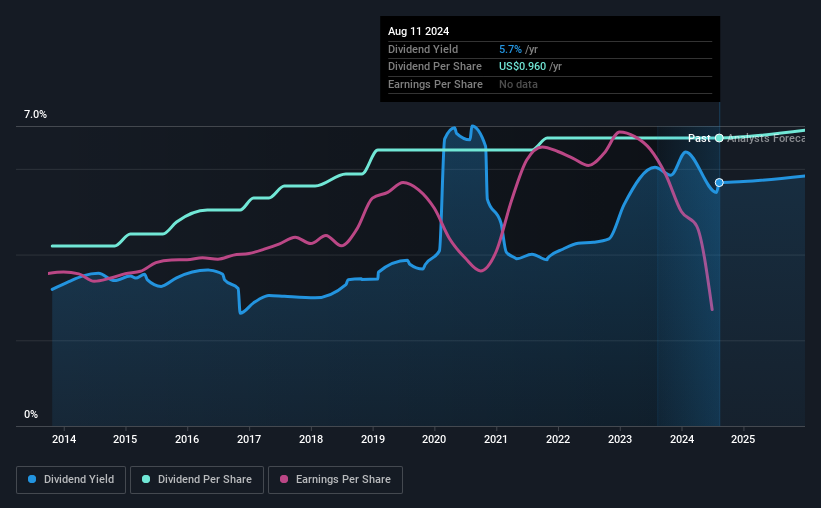Readers hoping to buy Provident Financial Services, Inc. (NYSE:PFS) for its dividend will need to make their move shortly, as the stock is about to trade ex-dividend. Typically, the ex-dividend date is one business day before the record date which is the date on which a company determines the shareholders eligible to receive a dividend. The ex-dividend date is of consequence because whenever a stock is bought or sold, the trade takes at least two business day to settle. Thus, you can purchase Provident Financial Services’ shares before the 16th of August in order to receive the dividend, which the company will pay on the 30th of August.
The company’s upcoming dividend is US$0.24 a share, following on from the last 12 months, when the company distributed a total of US$0.96 per share to shareholders. Calculating the last year’s worth of payments shows that Provident Financial Services has a trailing yield of 5.7% on the current share price of US$16.90. If you buy this business for its dividend, you should have an idea of whether Provident Financial Services’s dividend is reliable and sustainable. We need to see whether the dividend is covered by earnings and if it’s growing.
See our latest analysis for Provident Financial Services
If a company pays out more in dividends than it earned, then the dividend might become unsustainable – hardly an ideal situation. Last year, Provident Financial Services paid out 103% of its income as dividends, which is above a level that we’re comfortable with, especially if the company needs to reinvest in its business.
Generally, the higher a company’s payout ratio, the more the dividend is at risk of being reduced.
Click here to see the company’s payout ratio, plus analyst estimates of its future dividends.
Have Earnings And Dividends Been Growing?
Businesses with shrinking earnings are tricky from a dividend perspective. Investors love dividends, so if earnings fall and the dividend is reduced, expect a stock to be sold off heavily at the same time. Readers will understand then, why we’re concerned to see Provident Financial Services’s earnings per share have dropped 20% a year over the past five years. Ultimately, when earnings per share decline, the size of the pie from which dividends can be paid, shrinks.
Another key way to measure a company’s dividend prospects is by measuring its historical rate of dividend growth. Provident Financial Services has delivered an average of 4.8% per year annual increase in its dividend, based on the past 10 years of dividend payments. The only way to pay higher dividends when earnings are shrinking is either to pay out a larger percentage of profits, spend cash from the balance sheet, or borrow the money. Provident Financial Services is already paying out 103% of its profits, and with shrinking earnings we think it’s unlikely that this dividend will grow quickly in the future.
To Sum It Up
From a dividend perspective, should investors buy or avoid Provident Financial Services? Not only are earnings per share shrinking, but Provident Financial Services is paying out a disconcertingly high percentage of its profit as dividends. Generally we think dividend investors should avoid businesses in this situation, as high payout ratios and declining earnings can lead to the dividend being cut. All things considered, we’re not optimistic about its dividend prospects, and would be inclined to leave it on the shelf for now.
With that being said, if you’re still considering Provident Financial Services as an investment, you’ll find it beneficial to know what risks this stock is facing. For example, Provident Financial Services has 4 warning signs (and 1 which can’t be ignored) we think you should know about.
Generally, we wouldn’t recommend just buying the first dividend stock you see. Here’s a curated list of interesting stocks that are strong dividend payers.
Have feedback on this article? Concerned about the content? Get in touch with us directly. Alternatively, email editorial-team (at) simplywallst.com.
This article by Simply Wall St is general in nature. We provide commentary based on historical data and analyst forecasts only using an unbiased methodology and our articles are not intended to be financial advice. It does not constitute a recommendation to buy or sell any stock, and does not take account of your objectives, or your financial situation. We aim to bring you long-term focused analysis driven by fundamental data. Note that our analysis may not factor in the latest price-sensitive company announcements or qualitative material. Simply Wall St has no position in any stocks mentioned.


